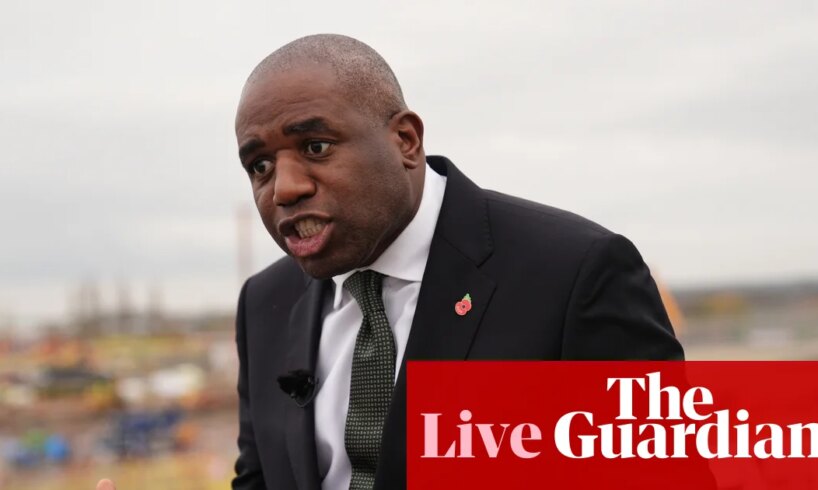
Lammy claims he made ‘right judgment’ in dodging prisoner question at PMQs because he did not have ‘all the details’
David Lammy has recorded a pooled interview about the prisoner release mistakes reveaved after yesterday’s PMQs. There were three main lines in the excerpt available so far.
Lammy, the deputy PM and justice secretary, defended his decision to dodge questions at PMQs yesterday about whether there had been another prisoner let out by mistake. The Conservatives have strongly criticised him for this, with Chris Philp, the shadow home secretary, saying that Lammy’s non-answer was “dishonest”, and Robert Jenrick, the shadow justice secretary, saying Lammy’s PMQs performance was “a disgrace” and “a dereliction of duty”. (See 9.34am.) Lammy was asked if he knew of another asylum seeker being released by mistake; at the time he knew that a foreign prisoner had been released earlier, but it is claimed that he did not know the full details of the offender, who turned out not to be an asylum seeker, it later transpired. Asked if he accepted that he should have given MPs more information, Lammy replied:
I first found out about this [the prisoner release error] on Wednesday morning. I was in the department, both learning from officials, but also preparing for prime minister’s questions.
At the dispatch box I did not have all of the details. That detail was actually released just later after I had finished at prime minister’s questions.
I took the judgment that is important when updating the house and the country about serious matters like this that you have all of the details. I was not equipped with all of the detail.
And the danger is you end up misleading the house and the general public. So that is the judgment I took. I think it’s the right judgment.
(It is hard to see how Lammy would have misled the Commons if he had stuck to telling MPs what facts he did know, and what he was still waiting to learn.)
Lammy claimed the foreign prisoner referenced at PMQs (Brahim Kaddour-Cherif, an Algerian), had been released by mistake from Wandsworth prison before the extra prisoner release checks ordered by Lammy were introduced. Lammy introduced those checks after the former asylum seeker Hadush Kebatu was wrongly freed from HMP Chelmsford prison. Lammy said:
We have found out that the release that has caused concern this week was actually before I introduce those checks just a few weeks ago, following the release of Kebatu.
And the other prisoner [Billy Smith] was a court mistake, not in fact a prison mistake.
This is odd because the MoJ announced on 27 October that those new checks were coming into force “from today”, but yesterday it was reported that Kaddour-Cherif had been let out by accident on 29 October. I have asked the MoJ for an explanation.
The truth is, I’ve been in post two months. The rate of release by error is too high. It has to come down.
That’s why I’ve asked Dame Lynne Owens to look at this, a former deputy Met commissioner, to review this and come back to me as quickly as she’s able to do.
And this is a paper-based system that obviously involves human error.
We had 800 errors under the last government. This is now gone on for a generation. Our prison system is in crisis. So we have to bear down on this. But we have a mountain to climb.
David Lammy speaking to the media during a groundbreaking event for a new prison next to HMP Gartree in Market Harborough today. Photograph: Jacob King/PAShare
Updated at 17.50 CET
Key events
18m ago
Afternoon summary
31m ago
Badenoch criticises Starmer for going to Cop30, claiming other leaders from ‘serious’ countries were staying away
2h ago
Teaching unions in England tell government they are ‘extremely concerned’ proposed pay award not properly funded
2h ago
Lammy claims he made ‘right judgment’ in dodging prisoner question at PMQs because he did not have ‘all the details’
3h ago
Government will find it ‘extremely difficult’ to meet its education priorities within budget set, IfG thinktank says
4h ago
Gordon Brown says two-child benefit must be abolished in full for Labour to meet goal to bring child poverty down
4h ago
Starmer says global consensus on climate change ‘gone’, but UK ‘all in’ on net zero transition
4h ago
Tories accuses Reeves of treating drivers as ‘cash machine’ as government hints EV pay-per-mile tax coming in budget
5h ago
‘More clowns than Billy Smart’s circus’ – Reform UK under fire as Kent council holds 1st full meeting since video leak
5h ago
Latest suspension means Reform UK has now lost 9 of its 57 Kent county councillors elected in May
5h ago
Spike in prison release mistakes linked to new rules for jails and early release scheme, Prison Service says
6h ago
Lammy says spike in prison release mistakes ‘unacceptable’, as he welcomes return of Billy Smith to jail
6h ago
Surrey fraudster Billy Smith hands himself in following release from HMP Wandsworth in error on Monday
6h ago
Referrals to Prevent up 27% on previous year, reaching record high of 8,778, Home Office figures show
7h ago
Large Scottish estates could be broken up under land reform bill passed by Holyrood
7h ago
Prison Governors Association criticises Tories for exploiting release errors, saying long-term underfunding to blame
7h ago
Any manifesto-busting tax rises in budget should be ‘temporary and conditional’, Tony Blair’s thinktank says
8h ago
Rachel Reeves ‘planning pay-per-mile tax for electric vehicles in budget’
8h ago
David Lammy set to face media as Tories accuse him of ‘dereliction of duty’ over prisoners released by mistake
Show key events only
Please turn on JavaScript to use this feature
Afternoon summary
David Lammy, the deputy PM and justice secretary, has defended his decision to dodge questions at PMQs yesterday about whether there had been another prisoner let out by mistake. (See 3.50pm.)
For a full list of all the stories covered on the blog today, do scroll through the list of key event headlines near the top of the blog.
Keir Starmer speaking at the Cop30 climate conference.
Photograph: Aaron Chown/PAShare
Badenoch criticises Starmer for going to Cop30, claiming other leaders from ‘serious’ countries were staying away
Kemi Badenoch has criticised Keir Starmer for going to the Cop30 climate conference, claiming that he should have stayed in the UK to focus on domestic politics.
As Starmer delivered a speech at the summit, Badenoch said:
Keir Starmer has gone to a conference where the four biggest polluters – the US, India, China, Russia – are not there. That means that nothing serious is going to be happening.
If those four countries aren’t doing anything, Keir Starmer should focus on fixing the domestic problems we have in our country first.
Badenoch also suggested that Starmer was the “only person” from a “serious country at that conference”, where other European leaders including France’s Emmanuel Macron are also expected to attend.
Asked to respond, a Labour source said:
The prime minister has travelled to Cop with the Prince of Wales to show UK leadership on the world stage, and delivering jobs and opportunity across Britain,” they said.
The leader of the opposition should look the 400,000 UK workers in clean energy in the eye and tell them she wants to throw it all away.
And for what? Old, rusty arguments stuck in the past that she’s forced to adopt because her dwindling number of supporters demand it.
Kemi Badenoch during a visit to the JCB Academy in Rocester, Uttoxeter, today. Photograph: Danny Lawson/PAShare
Teaching unions in England tell government they are ‘extremely concerned’ proposed pay award not properly funded
Richard Adams
Richard Adams is the Guardian’s education editor.
England’s teaching unions have written to education secretary Bridget Phillipson warning that the pay award she recently offered – worth 6.5% over three years – will be swiftly eroded by inflation and cause more teachers to quit the profession.
The joint letter, from the general secretaries of the National Education Union, the NASUWT, the National Association of Head Teachers and the Association of School and College Leaders, says they are “extremely concerned” that Philipson’s offer relies on over-optimistic inflation forecasts and will not be funded by government, meaning it will eat into school budgets.
The unions have urged Phillipson to resubmit evidence supporting “fully funded, above-inflation awards” to the independent body that makes pay recommendations.
The letter says:
Any award that is not fully funded will inevitably result in further cuts to staffing and essential provision, undermining the ability of schools to deliver high-quality education for all pupils …
Over a million pupils are already taught in classes of more than 30, the highest number in a generation.
Daniel Kebede, the NEU’s general secretary, added:
The government has created anxiety amongst the profession by putting forward evidence that suggests a below-inflation pay award that is to be funded out of existing budgets. We expected better from Labour.
The years of pay cuts since 2010 have already caused severe recruitment and retention problems and hit teacher living standards hard. Further pay cuts will make things even worse.
Share
Lammy claims he made ‘right judgment’ in dodging prisoner question at PMQs because he did not have ‘all the details’
David Lammy has recorded a pooled interview about the prisoner release mistakes reveaved after yesterday’s PMQs. There were three main lines in the excerpt available so far.
Lammy, the deputy PM and justice secretary, defended his decision to dodge questions at PMQs yesterday about whether there had been another prisoner let out by mistake. The Conservatives have strongly criticised him for this, with Chris Philp, the shadow home secretary, saying that Lammy’s non-answer was “dishonest”, and Robert Jenrick, the shadow justice secretary, saying Lammy’s PMQs performance was “a disgrace” and “a dereliction of duty”. (See 9.34am.) Lammy was asked if he knew of another asylum seeker being released by mistake; at the time he knew that a foreign prisoner had been released earlier, but it is claimed that he did not know the full details of the offender, who turned out not to be an asylum seeker, it later transpired. Asked if he accepted that he should have given MPs more information, Lammy replied:
I first found out about this [the prisoner release error] on Wednesday morning. I was in the department, both learning from officials, but also preparing for prime minister’s questions.
At the dispatch box I did not have all of the details. That detail was actually released just later after I had finished at prime minister’s questions.
I took the judgment that is important when updating the house and the country about serious matters like this that you have all of the details. I was not equipped with all of the detail.
And the danger is you end up misleading the house and the general public. So that is the judgment I took. I think it’s the right judgment.
(It is hard to see how Lammy would have misled the Commons if he had stuck to telling MPs what facts he did know, and what he was still waiting to learn.)
Lammy claimed the foreign prisoner referenced at PMQs (Brahim Kaddour-Cherif, an Algerian), had been released by mistake from Wandsworth prison before the extra prisoner release checks ordered by Lammy were introduced. Lammy introduced those checks after the former asylum seeker Hadush Kebatu was wrongly freed from HMP Chelmsford prison. Lammy said:
We have found out that the release that has caused concern this week was actually before I introduce those checks just a few weeks ago, following the release of Kebatu.
And the other prisoner [Billy Smith] was a court mistake, not in fact a prison mistake.
This is odd because the MoJ announced on 27 October that those new checks were coming into force “from today”, but yesterday it was reported that Kaddour-Cherif had been let out by accident on 29 October. I have asked the MoJ for an explanation.
The truth is, I’ve been in post two months. The rate of release by error is too high. It has to come down.
That’s why I’ve asked Dame Lynne Owens to look at this, a former deputy Met commissioner, to review this and come back to me as quickly as she’s able to do.
And this is a paper-based system that obviously involves human error.
We had 800 errors under the last government. This is now gone on for a generation. Our prison system is in crisis. So we have to bear down on this. But we have a mountain to climb.
David Lammy speaking to the media during a groundbreaking event for a new prison next to HMP Gartree in Market Harborough today. Photograph: Jacob King/PAShare
Updated at 17.50 CET
Government will find it ‘extremely difficult’ to meet its education priorities within budget set, IfG thinktank says
Richard Adams
Richard Adams is the Guardian’s education editor.
The government’s spending plans are leaving it struggling to improve conditions in England’s schools, such as addressing the crisis in special educational needs and disabilities (Send) provision or recruiting more teachers, according to a new Institute for Government report.
According to the IfG, it will be “extremely difficult for the government to meet its education priorities within the budget it has set” over the coming parliament.
The report finds that two-thirds of state special schools are now operating above capacity, while spending on Send has risen from £6.7bn in 2012-13 to £11.1bn in 2025-26, a 66% increase.
Education, health and care plans (EHCPs), at the centre of the government’s likely plans to reform Send provision, cost £1,000 more on average than the funding provided to meet the needs described.
Amber Dellar, the report’s author, said:
With no clear strategy to reform the Send system or tackle workforce shortages, the government is struggling to keep its education priorities on track. That leaves children with special educational needs and those from low-income backgrounds without the support they need, as gaps in attendance and outcomes widen.
Share
Updated at 15.44 CET
Keir Starmer, right, and Prince William arrive at the Julio Cezar Ribeiro International Airport
in Belém, Para State, Brazil, to attend the Cop30 summit today. Photograph: Ben Stansall/APShare
Gordon Brown says two-child benefit must be abolished in full for Labour to meet goal to bring child poverty down
Patrick Butler
Patrick Butler is the Guardian’s social policy editor.
Gordon Brown has renewed his call for the two-child benefit cap to be fully abolished, calling it a “stain” on the UK’s reputation and warning ministers off potential compromise measures that would keep the policy in place.
The former Labour prime minister, speaking at a reception in London to mark the 60th anniversary of the Child Poverty Action Group charity, said the policy should be “banished from the statute book as soon as possible”.
Brown said:
It is the two-child rule that every year is responsible for the numbers of children in poverty rising … Without abolishing the two-child rule the government will not meet its target to have poverty coming down at the end of the parliament, lower than at the beginning.
The government faces a crucial decision over whether to retain the policy – much hated by Labour MPs as a turbo driver of family hardship and relic of Tory austerity – when it publishes its child poverty reduction strategy in the next few weeks.
The Treasury is concerned about the £3.5bn a year cost and is understood to be considering measures to keep the policy in place while watering down its impact such as by extending the limit to three children.
Brown said only full abolition would effectively reverse the upward trend of child poverty. There are 4.5 million children in the UK in relative poverty – a figure currently expected to rise to a historic high by the end of the decade.
Child Poverty Action Group was created by campaigners in 1965 to push for increases to family allowances and has become a leading voice in the welfare rights and anti-poverty movement.
Gordon Brown speaking at an event today to mark the 60th anniversary of the Child Poverty Action Group (Cpag), at Somerset House, in central London. Photograph: James Manning/PAShare
Updated at 15.01 CET
Starmer says global consensus on climate change ‘gone’, but UK ‘all in’ on net zero transition
Keir Starmer will admit the “consensus is gone” on climate change but insist Britain is “all in” on net zero in a speech to the UN Cop30 summit, PA Media reports.
Addressing the climate change conference in Belém, the city gateway to the Brazilian Amazon basin, Starmer is expected to say:
Ten years ago, the world came together in Paris … united in our determination to tackle the climate crisis. A consensus based on science that is unequivocal.
And this unity was not just international – it was there within most of our countries too. There was cross-party consensus in the UK. The only question was how fast we could go.
Today however, sadly that consensus is gone.
But Starmer will also challenge sceptics calling for a slowdown on climate action, telling the summit:
Can energy security wait too? Can billpayers wait? Can we win the race for green jobs and investment by going slow? Of course not.
He will describe green policies as a “win-win”.
The greater our collective ambition, the more progress we make in tackling the climate crisis, and the greater the opportunities we create.
Just for UK businesses … providing goods and services for the global net zero transition could be worth £1tn by 2030.
So look – my message here is that the UK is all in.
Because we know, you don’t protect jobs and communities by sticking with the status quo, you don’t meet a challenge like climate change by standing still.
You do it by embracing change, embracing the opportunities, and doing so together.
As PA reports, Starmer is travelling to Belém on Thursday along with energy secretary Ed Miliband and the Prince of Wales on Thursday, having attended William’s Earthshot Prize ceremony last night.
The PM is expected to have more than one bilateral meeting with counterparts, though it was unclear on Thursday morning who he would come face to face with as teams seek to carve out time during the one-day visit.
Keir Starmer (right) talking to the Prince of Wales at the fifth annual Earthshot Prize Awards Ceremony at the Museum of Tomorrow in Rio de Janeiro last night. Photograph: Ian Vogler/Daily Mirror/PAShare
Tories accuses Reeves of treating drivers as ‘cash machine’ as government hints EV pay-per-mile tax coming in budget
The Conservatives have responded to reports that Rachel Reeves may introduce a pay-per-mile tax for electric vehicles (EVs) in the budget by accusing Labour of treating motorists “as a cash machine”.
Richard Holden, the shadow transport secretary, said:
We now have the grotesque chaos of a Labour government – that came to power without a plan – now using taxpayers’ money on the one hand to subsidise people to buy foreign made electric cars and on the other hand now wants to tax them for doing so as well as hit all other drivers with a fuel duty increase.
Britain cannot afford a spineless government that rather than standing up to its own backbenchers to stop the exponential growth in welfare payments instead treats motorists as a cash machine to plug the holes Rachel Reeves and Sir Keir Starmer are creating.
Families are not an ATM for Rachel Reeves, yet under Labour, everyone who relies on a vehicle is being lined up for another shakedown.
There has been speculation about the government introducing a new tax on electric cars for some time because, as people switch from petrol cars to EVs, the government is expected to lose about £15bn a year by 2050 in lost fuel duty.
But today the Telegraph has splashed on a detailed report by Ben Riley-Smith saying Reeves is due to announce a plan to charge EV users 3p per mile, on top of other taxes. He says:
The scheme, set to kick in from 2028 after a consultation, will mean the average driver faces paying an extra £250 a year.
The Treasury will make the move amid falling fuel duty revenue as people move from petrol to electric cars. Up to six million people are set to be driving EVs by the time the tax comes in.
Ministers will frame the move as one of fairness, as drivers of petrol cars currently pay £600 a year on average in fuel duty.
They will also argue that it is different from traditional pay-per-mile schemes, with a fee taken each year on estimated travel and no mass electronic monitoring of movements.
The government has not confirmed the details of the report, but it has said in a statement that it believes the way drivers are taxed needs to be made “fairer” to account for the fact the EV drivers don’t pay fuel duty.
Share
‘More clowns than Billy Smart’s circus’ – Reform UK under fire as Kent council holds 1st full meeting since video leak
Ben Quinn
Ben Quinn is a senior Guardian reporter.
The embattled Reform UK leader of Kent county council, Linden Kemkaran, was in combative form during a full meeting of the party’s ‘flagship’ council today, likening her experience to that of her son, who she said had just finished phase one of military training and had been “beaten up and ambushed.”
She compared the drop-out rate among his fellow recruits to the axing of former Reform councillors in Kent, telling the meeting:
Along the way some had quit because they couldn’t hack it. Others had been thrown out for bad behaviour or were simply unwilling to accept discipline.
“It did make me reflect on my own troops,” said Kemkaran, who had earlier answered with single word “yes,” when an opposition councillor asked if she believed her own behaviour was in line with the Nolan principles setting out recognised standards in public life, and Kent’s own code of conduct.
This morning Reform also faced repeated pressure from opposition councillors over the question of whether it would be raising council tax after promising savings in leaflets to voters in the local elections. A senior member of Reform’s Kent team let slip earlier last month that rates may have to rise by the maximum of 5%.
Brian Collins, a member of the Reform cabinet, said no decision had been made on council tax as the local authority was awaiting the outcome of a government funding review. Last month, a fellow cabinet member had said she believed Kent would raise council tax by 5% – the maximum permitted – as councils try to honour their legal duty to make sure spending adds up before budgets are set for next year.
“You are running away from residents when it comes to the question of what you will do on council tax,” said Alister Brady, a Labour councillor. While he did not agree with previous Tory administration of what is one of Britain’s largest county councils, which has a £2.5bn annual budget, Brady said that at least the Conservatives had managed to get together spending plans by this point.
Harry Rayner, the Tory leader, said the Reform council was now “mired in the consequences of self-inflicted damage” and he had seen nothing to rival it in 40 years of local government experience. He said:
This council has been made a laughing stock with more clowns on display since I saw Bill Smart’s last circus.
This was the first full meeting of the council since the ruling Reform UK group was thrown into chaos by a video leak to the Guardian of a meeting revealing bitter internal tensions.
Nigel Farage with Brian Collins (left) and Linden Kemkaran (right), with other Reform UK councillors standing behind them, as they all posed for a photograph when Farage visited the council in July.
. Photograph: PA Images/AlamyShare
Updated at 13.47 CET
Latest suspension means Reform UK has now lost 9 of its 57 Kent county councillors elected in May
Ben Quinn
Ben Quinn is a senior Guardian reporter.
Nigel Farage’s Reform UK has suspended yet another member of its ‘flagship’ county council in Kent as it held its first full meeting since the party’s councillors were thrown into crisis by a leaked meeting revealing bitter internal tensions.
The departure of Isabella Kemp, who has also been working as a data protection officer at Reform’s HQ, means that Reform has lost nine of the 57 councillors elected during the local elections in May.
The latest turmoil comes after the Guardian published a recording of an incendiary internal meeting in which the council leader, Linden Kemkaran, told dissenting Reform UK colleagues they had to “fucking suck it up” if they didn’t like her decisions.
Four Reform councillors were suspended shortly after the leak, while one of those and another who had been suspected over separate allegations have now formed an “Independent Reformers” group on the council.
Kemkaran faced questions at a full meeting of the council on Thursday about the real-world impact of the suspension of Kemp, who had been chair of the adult social care and public health cabinet committee.
The Liberal Democrats, who are the second largest group with 12 councillors, appealed to Kemkaran to restore Kemp, who now sits as an independent, as chair of the important committee.
Share
Updated at 13.36 CET
Spike in prison release mistakes linked to new rules for jails and early release scheme, Prison Service says
Here is a Ministry of Justice chart illustrating the “spike” in prison release mistakes that David Lammy was referring to.
Prison release error figures Photograph: MoJ
And this is what the HM Prison and Probation Service’s annual digest says about these figures.
In the 12 months to March 2025, 262 prisoners were released in error. This is a 128% increase from 115 the previous year, and the highest in the time series. Of the 262 releases in error, 233 of these releases in error occurred from prison establishments, while 29 were released in error at the courts. Releases in error from establishments could also be a result of errors by the court.
Releases in error remain infrequent. The rise is believed to be linked to the requirement on Offender Management Units to digest and implement a range of operational and legislative changes. The rise in this year also partly reflects a number of offenders who were released in error in the first tranche of SDS40 due to an issue with a repealed Breach of Restraining Order offence, which was swiftly identified and corrected with legislation. These offenders were all rearrested and returned to custody.
SDS40 is the early release scheme introduced by the government in September last year, in response to the prison overcrowding crisis.
In a footnote to this passage, the HMPPS report says;
Due to the relatively low numbers, year-on-year changes should be interpreted with caution. The number of releases in error should be considered in the context of the number of releases in the same time period and changes in the operational environment.
Share
Updated at 13.22 CET





